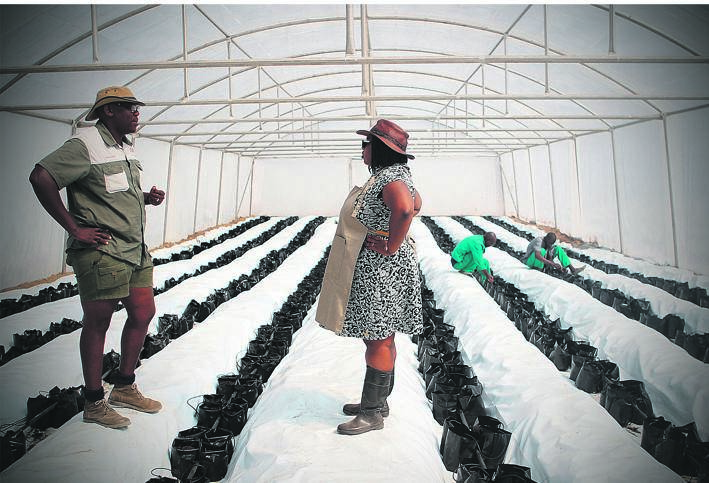
Those who want land are not necessarily after a big, remote farm. We visited three urban farming ventures to find out what it means to farm in the city.
They’re a power team on the urban agriculture and agroprocessing scene. Meet Urban Grown co-founders Simbarashe (Simba) Chimhandamba (33) and Nonhlanhla Mokoena-Chimhandamba (35), who began farming in 2015 under protected covers on land in Diepsloot, northern Johannesburg. The married couple recently expanded with open land farming in Pretoria, servicing customers within a 70km radius.
Says Nonhlanhla: “Both my partner and I are from corporate. I was in marketing and brand management. Because of our corporate history we had the skill to look at things from top to bottom, especially when we look at profit and loss.”
She describes Simba as the one with the green thumb. “He heads up the production and key accounts for the business. As much as this is a woman-owned business, he really steers us and has set out the strategy.”
Nonhlanhla says because they wished young people knew that farming was not a “dead career”, they started Urban Grown to farm in the city and close to their customers in urban areas.
“What makes our farming different is the technology and efficiencies we use [including hydroponics, which involves farming without soil].”
Urban Grown produces spinach, baby marrow, baby spinach, capsicum, kale, basil, coriander and cabbage on their 23-hectare farm in Pretoria and their smaller, but high-value crop farm in Diepsloot.
“City Lodge was our first customer and funded us to become agroprocessors and farmers through their programme,” says Nonhlanhla.
Pick n Pay and food service distributor Bidfood followed.
In the early days of the business, he went for a year without earning a salary “but I did it because I believed in it”, says Simba.
He was trained by Israeli agronomists and later visited the country to learn best practices.
Locally, he has been welcomed by the farming community. “It’s somehow a brotherhood. A lot of the systems and processes we adopt are things we have seen in practice with other farmers.”
Nonhlanhla says agriculture is still a man’s world. “You meet certain suppliers and you might get challenged because you are a woman. But in this industry, we are farmers first before we are black or white, male or female and we talk about our challenges,” she says.
In Simba’s experience, some people don’t take you seriously if they mistake you for someone who benefited from land reform.
“The sad reality is that there are not enough black commercial farmers, especially within the Gauteng region. You often get mistaken for someone who is a new-dispensation farmer who got free land from the government and that often puts up a wall.”
Simba says during harvest time he’s up at 4am and is on the farm by 5am. By 11am they have done the reaping and by 1pm the products arrive at the pack houses and a second shift starts work.
As for the future, they want to build a business that can sustain their grandchildren and their children.
“For us it is about owning the value chain. We started by owning the infrastructure and then the equipment and then trucks. The land was the very last thing we owned.”
- This package is part of a journalism partnership with Africa Check, the continent’s leading fact-checking organisation. The project aims to ensure that claims made by those in charge of state resources and delivering essential services are factually correct. In the run-up to this year’s national and provincial elections it will be increasingly important that voters are able to make informed decisions. This series aims to provide voters with the tools to do that. The Raith Foundation contributed to the cost of reporting.




 Publications
Publications
 Partners
Partners








